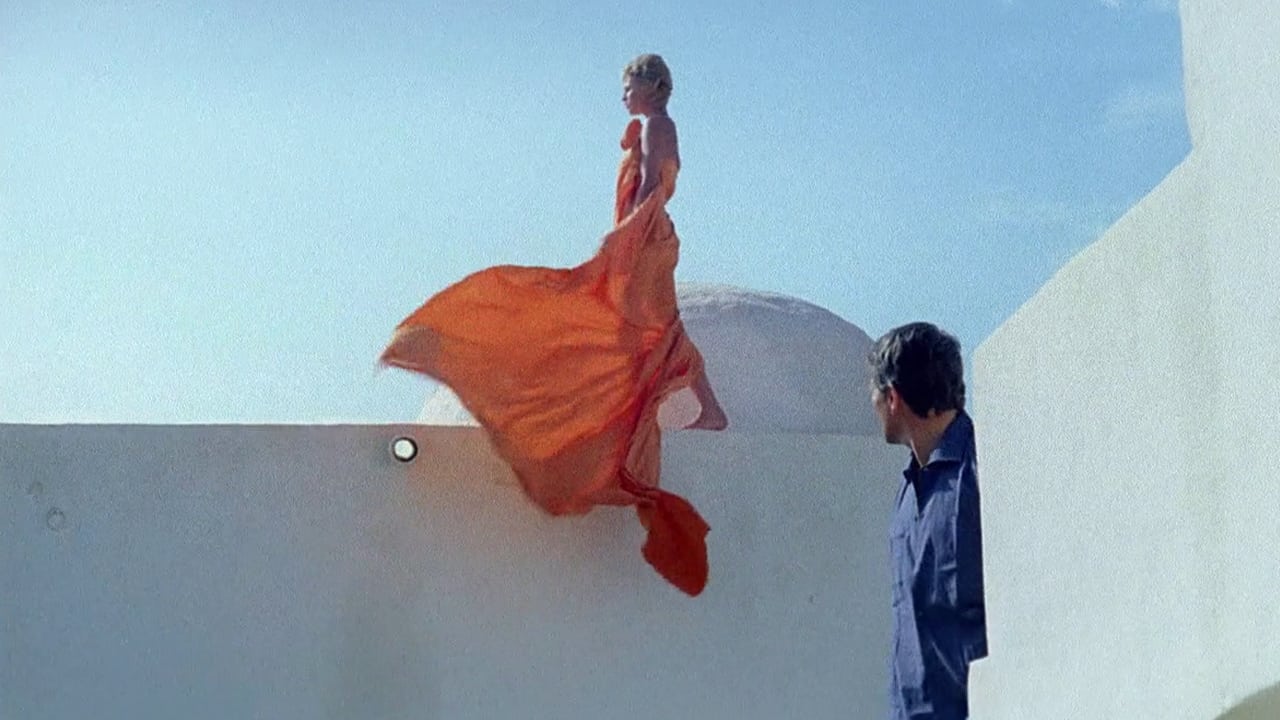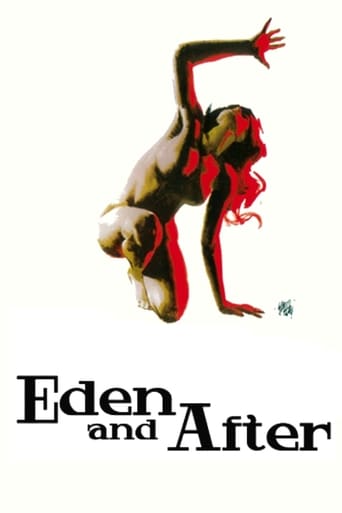

Plot so thin, it passes unnoticed.
... View MoreCharming and brutal
... View MoreAn Exercise In Nonsense
... View MoreEach character in this movie — down to the smallest one — is an individual rather than a type, prone to spontaneous changes of mood and sometimes amusing outbursts of pettiness or ill humor.
... View More"Boredom reigns supreme; we will do anything to escape it. Suffering is nothing more than a newspaper headline." - Schuberth Though David Lynch cites him as an influence and though he wrote the screenplay for "Last Year at Marienbad", Alain Robbe-Gillet's feature films now tend to get little attention. One of his best, and his first in colour, is "Eden and After", a near impenetrable co-production between France and Czechoslovakia.The film's first third takes place in the "Eden Cafe", a psychedelic joint rife with youths, drugs, jaded sensualists, Coca Cola billboards, "Drink Blood" slogans and mock funerals. It's a den of apathy, Eden's inhabitants withdrawn from political engagement and basking in escalating games of performance/role-playing, each of which stresses risk, ritual, power, even rape. Outside Eden, the world is an industrial wasteland; Antonioni's "Red Desert" at midnight.This cloistered, Edenic existence is shattered by the arrival of "the stranger", a ghostlike figure who imposes his visions upon Violeete, a young woman whom he meets. Significantly, these visions are triggered by the vanishing of an abstract painting. From here on, reality and "hallucinations" seem to bleed into one another, Violette thrown headlong into the deserts of North Africa – mankind's cradle – and other bizarre locations, including factories and the site of the stranger's own death. As these visions plague Violette, who seems deliriously lost in time, she finds herself "collecting" various objects, be they keys, books, or postcards. But the objects fail to ground Violette. As she becomes increasingly unhinged, sadomasochistic images needle into her skull.Thematically "Eden and After" may be Godard/Fassbinder in full activist mode – chartering the post-1960s death of innocence, the souring of idealism, a global retreat into addictive and increasingly intense bio-chemical and mediated escapades (at one point a Russian roulette player wishes he were playing with real bullets), the beginning of Fukuyama's "end of history" and the seeming death of "social alternatives" - but visually it's a wholly unique beast. Robbe-Grillet, who has always been interested in phenomenology, structures the film as a mythic spirit-quest, his camera trying to sketch the fleeting, emotional and psychological "surfaces" of his characters. Indeed, almost all the role-playing (and stories) that unfold in Eden have analogues in Violette's "outside world", implying that the film is either a drug fuelled dream, a premonition of an already unfolding future or that Eden, for all its distractions, is itself a training ground, a place where the subject's "inside" is colonised before he/she enters the wastelands "outside".Early in his career, Robbe-Grillet set out to be "hostile to the very idea of a narrative". We see this clearly in many of his films and screenplays, most of which shun continuity and causality in favour for a series of seemingly unrelated, temporally out-of-sync segments. This is largely why viewers remain sympathetic to the Cahiers du Cinema or "Right Bank" group of French filmmakers, who tend to be a bit more audience friendly (Truffaut, Chabrol etc), whilst shunning Grillet and the "Left Bank" or "Nouveau Roman" (New Novel) group of film-makers (Resnais, Grillet, Agnes Varda, Melville, Chris Marker, Richard Roud), who ignored convention and had an already existing engagement with experimental literature. Note that many of the Right Bank filmmakers – Godard, Rohmer, Rivette – would come to resemble their Left Bank brothers from the 1970s onwards.No surprise, then, that "Eden and After's" narrative is based on the musical structures of Austrian composer Arnold Schoenberg, who invented the twelve-tone technique, a technique that ensured that all 12 musical notes are essentially given equal importance. For Schoenberg, the "twelve-tone" is such that there is no longer any dominant "sound", just a constant, often discordant sounding (how can something be disharmonious when the musical piece is designed to have no harmony?) repetition of the same notes. So what "Eden and After" does is takes its very loose plot (a hybrid of "Alice in Wonderland" and the Marquis De Sade's "Salo" and "Justine") and repeats a series of 12 themes - each with its own 12 sets of image banks - over the course of twelve segments (or some argue ten: "Intro", "Eden", "Drugs", "Games", "The Stranger", "The Factory", "Tunisia", "Djerba", "The DutchMan's Villa", "Prison", "The Desert"). For example, Robbe-Grillet will have real villages overlap with postcards of villages, or blood and blood-art overlap with sexual fluids and real blood. Meanwhile, doubles are mirrored to doubles, incidents occur in groups, and motifs are repeated and retextualized as they reappear from scene to scene. This leads to a visually unorthodox film, but one which viewers sympathetic to more surreal, expressionistic directors may find appealing. 8/10 - Multiple viewings required.
... View MoreI knew of novelist Alain Robbe-Grillet chiefly by virtue of his script for Alain Resnais’ art-house masterpiece LAST YEAR IN MARIENBAD (1961; which I intend to revisit in tribute to the author). Eventually, I became aware of his own films as a director via a thread on “The Latarnia Forums” – which, back then, had intrigued me a great deal and, in fact, was highly pleased to acquire three of them a few months ago. Unfortunately, the prints were incredibly murky – so I kind of lost my enthusiasm and it’s only now, in honor of his passing, that I made a concentrated effort to stick with them! However, my first encounter with these titles proved a disappointment: as I said, the picture quality left a lot to be desired – but, frankly, so did the film itself! Judging by the celebrated Resnais work, I knew I’d be in for an oblique and possibly multi-layered piece – however, to be honest, I found it made little sense and that it was generally weird for weirdness’ sake! In fact, if I had to compare Robbe-Grillet’s style here with that of contemporaneous film-makers, I’d say this is Godard meets Antonioni meets Jodorowsky!; that, in itself, would sound like a most interesting proposition to some…but, I assure you, the film is a bit of a bore despite plenty of nudity (the writer-director seems to have a thing for sadomasochism, as can also be seen from TRANS-EUROP-EXPRESS [1966]) and a stunning-looking heroine in Catherine Jourdan (sporting cropped blonde hair).The plot, such as it is, has to do with a group of disaffected students who are shown a way out of their ennui (via a concoction he offers) by a man they meet at a café (the Eden of the title); Jourdan is supposed to have a night-time tryst with him at a factory but, on arriving for the appointment, she is intimidated by some of her fellow students and finds the man dead! Taking a clue from a postcard of an Arabian town found in the stranger’s pocket, Jourdan gets mixed-up in espionage (the MacGuffin in this case being a valuable missing portrait), games of a sexual nature, drug-induced hallucinations and murder; eventually, we come full circle and the story returns to the Eden and the arrival once again of the stranger...
... View MoreEDEN AND AFTER is the kind of movie that tends to get overrated by some. Robbe-Grillet is a famous French intellectual and artist and that immediately sends some people Looking For Significance. In fact, though, EDEN is basically a softcore flick covered with spoonfuls of Sixties pretension. I like that kind of thing, once in awhile, and so I basically liked it, but it's hardly anything *more* than that.A group of bored students are wiling away the hours at a club called "Eden", doing silly things like staging pseudo Russian roulette encounters, when suddenly they meet up with a mysterious stranger who offers them a way out of their boredom, with descriptions of Africa and a powder called something like "powder of fear". The leader of the gang (the quite lovely Catherine Jourdan) takes the powder, and the rest of the movie might be interpreted as her hallucination: rampant s&m imagery, tribal dances in the Middle East, her friends now seen as enemies, and a decrepit factory belching out odd effluent.It doesn't make sense, I'm not even sure it's supposed to make much sense, Robbe-Grillet or no Robbe-Grillet. There's a lot of Sixties "experimentation", and that already seems very dated nowadays --but it can be approached as camp, I happen to have a small weakness for the style and generally enjoyed it. There's a lot of silly playing around with the sound in particular, as well as a lot of self-important running about and the Introduction of Very Important Symbols (the factory, for instance, although it gets weirder).This kind of thing can get bogged down pretty quickly, and indeed like most movies of this type it could've stood 15 to 20 minutes cut out of it. It helps, though, that there's plenty of gratuitous nudity and generally trippy imagery about, to keep it moving. R-G had a basic, but striking color sense, and seemed particularly fond of bold colors over white to make a statement. Ms. Jourdan is beautiful and we get to see a lot of her.I would describe this as a highbrow softcore flick, and if that description perks your interest you should check it out. But I wouldn't waste my time looking for depths that aren't there.
... View MorePhilosophical thriller or Post-Modern jigsaw or S&M skinflick - or all three at once - Alain Robbe-Grillet's first colour film is a dazzling, at times frustrating experience. Try to imagine Alice in Wonderland crossed with Story of O and you may get some idea of the perverse sensibility at work behind it. Starting off in a labyrinthine, mirror-lined nightclub called Eden, moving on to a disused factory with huge industrial vats full of sperm, ending up on the Tunisian island of Djerba - with, naturally, a detour through a jet-set torture chamber where glamorous naked women are crucified or suspended in cages - Robbe-Grillet takes his wide-eyed and waif-like heroine (Catherine Jourdan) on a spiritual and erotic odyssey to...what exactly? Sorry, but I don't know either.Nor does Robbe-Grillet seem the tiniest bit inclined to let us in on the secret. According to a mysterious stranger (Pierre Zimmer) who breaks in on Jourdan and her jaded pals, it's something to do with transcending the limits of rational Western consciousness. Finding a darker and more primitive reality. "Break on through to the other side" - or so The Doors might put it. Intriguing enough in a drugged-up late 60s kind of way, but Robbe-Grillet's own personal "doors of perception" don't seem to open very far beyond a spot of mild flagellation, or some Emmanuelle-style sex tourism on a photogenic Third World beach.At least the film is exquisite to behold. Its imagery is bizarre and erotic and disturbing. Catherine Jourdan - who went on to make even weirder movies with director/husband Alain Fleischer - is a lovely heroine in the tradition of the Marquis de Sade's Justine. She combines the doe-eyed fragility of a Mia Farrow with the icy blonde sensuality of a Catherine Deneuve. As her lover, Richard Leduc is undeniably handsome - but he seems far too sweet and mild-mannered for some seriously nasty sex-games with a blindfold and a bucket of scorpions. As for any ultimate meaning, you may or may not want to work that out. I suspect most of us would be happier not knowing.Incidentally, Eden and After is one of Robbe-Grillet's MORE linear films in terms of plot - yet it's also one of his hardest to grasp. Perhaps there's a lesson to be learned from that, but - once again - don't ask me what!David Melville
... View More